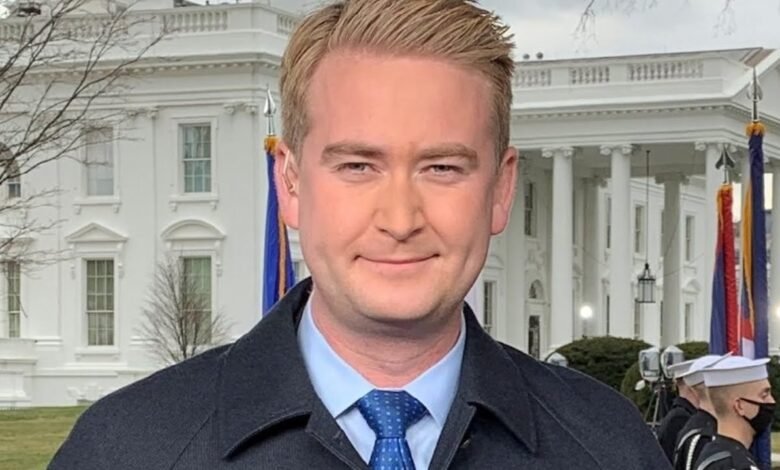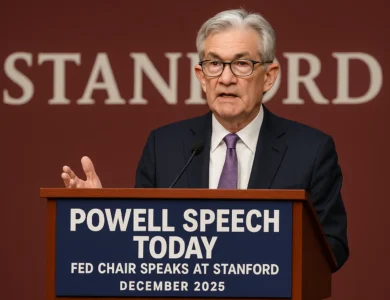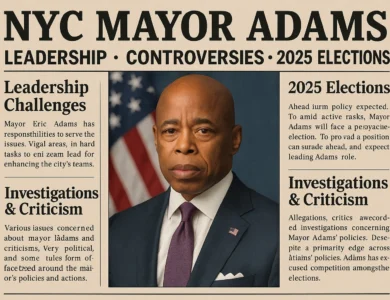
In the fast-paced world of White House press briefings, few journalists have made as significant an impact as Peter Doocy. The Fox News correspondent has become synonymous with bold questioning and unflinching journalism that often leaves administration officials scrambling for answers. His direct approach to presidential communications has not only defined his career but has fundamentally altered the landscape of White House reporting.
Peter Doocy’s questions have consistently pushed boundaries, challenged narratives, and forced transparency in ways that have both impressed and frustrated political figures across Washington D.C. From his early days covering political campaigns to his current role as a senior White House correspondent, Doocy has built a reputation for asking the questions that others might shy away from. His investigative journalism style and willingness to press for detailed answers have made him a household name among political news consumers.
The significance of Doocy’s press conference questions extends beyond mere journalism; they represent a critical component of democratic accountability. In an era where media scrutiny of government officials has never been more important, his persistent questioning serves as a vital check on executive power. His exchanges with various press secretaries and even presidents have become viral moments that shape public discourse and political narratives.
This comprehensive analysis examines seven of the most shocking Peter Doocy questions that have reverberated through the halls of power in Washington. Each question represents not just a moment of journalistic excellence, but a pivotal point that influenced political conversations, policy discussions, and public opinion. These moments showcase how effective journalism can cut through political rhetoric to demand real answers from those in positions of authority.
1. The Afghanistan Withdrawal Confrontation That Stunned Officials
The Question That Changed Everything
During one of the most critical periods of the Biden administration, Peter Doocy’s Afghanistan questions became a defining moment in White House press relations. In August 2021, as the chaotic withdrawal from Afghanistan dominated headlines, Doocy posed a question that left administration officials visibly uncomfortable and sparked nationwide debate about presidential accountability.
The Afghanistan withdrawal question centered on the administration’s handling of intelligence reports and evacuation timelines. Doocy’s persistent follow-up questions about the decision-making process and communication with allies demonstrated his commitment to investigative reporting that goes beyond surface-level responses. His approach forced officials to address specific timeline discrepancies and policy decisions that had far-reaching consequences.
Impact on Political Discourse
This particular exchange became a watershed moment for White House transparency discussions. Political analysts across the spectrum acknowledged that Doocy’s questioning technique had forced a level of detail from administration officials that might not have emerged otherwise. The media coverage of this exchange extended far beyond traditional news cycles, influencing public opinion and congressional oversight discussions.
2. Energy Policy Questions That Exposed Policy Contradictions
Drilling Down on Environmental Policies
Peter Doocy’s energy questions have consistently highlighted contradictions in administration messaging about climate policy and domestic energy production. His strategic questioning about gasoline prices, pipeline decisions, and renewable energy timelines has exposed gaps between campaign promises and governing realities.
The environmental policy questions posed by Doocy have forced press secretaries to navigate complex explanations about the balance between climate commitments and immediate economic concerns. His ability to frame questions about energy independence in ways that demand specific policy explanations has made these exchanges particularly memorable and newsworthy.
Economic Implications Revealed
Through his economic policy questioning, Doocy has illuminated the real-world impacts of energy decisions on American families. His questions about gas prices and energy costs have consistently brought abstract policy discussions down to practical, everyday concerns that resonate with viewers nationwide.
3. Immigration Border Crisis Exchanges That Demanded Answers
Challenging Immigration Narratives
Peter Doocy’s immigration questions have become some of his most impactful moments in White House briefings. His persistent questioning about border security, immigration enforcement, and policy implementation has forced administration officials to address specific details about immigration operations and outcomes.
The border crisis questions posed by Doocy have consistently challenged official narratives and demanded concrete data about immigration statistics, enforcement actions, and policy effectiveness. His approach to immigration policy questioning has helped bring national attention to border issues and their implications for communities across America.
Policy Transparency Achieved
Through his immigration reporting, Doocy has successfully pushed for greater transparency in how immigration policies are developed, implemented, and measured for effectiveness. His questions have led to more detailed explanations of policy rationales and their intended outcomes.
4. COVID-19 Policy Questions That Exposed Scientific Inconsistencies
Pandemic Response Scrutiny
During the height of the COVID-19 pandemic, Peter Doocy’s COVID questions became essential viewing for Americans seeking clarity about constantly changing health policies. His pandemic policy questions consistently challenged the scientific basis for various restrictions and mandates.
The COVID-19 questioning by Doocy helped expose inconsistencies in messaging between different government agencies and officials. His persistent follow-up questions about mask mandates, vaccine requirements, and travel restrictions forced more detailed explanations of the scientific reasoning behind policy decisions.
Public Health Communication
Through his health policy reporting, Doocy has played a crucial role in demanding clearer communication about public health measures and their rationales. His questions have helped bridge the gap between complex scientific recommendations and public understanding.
5. Foreign Policy Questions That Challenged International Relations
Diplomatic Accountability
Peter Doocy’s foreign policy questions have consistently pushed for greater accountability in America’s international relationships and diplomatic decisions. His international relations questions have covered everything from alliance relationships to military commitments abroad.
The diplomatic policy questioning by Doocy has forced administration officials to explain complex international situations in terms that American voters can understand and evaluate. His approach to foreign affairs reporting has helped bring transparency to decision-making processes that often operate behind closed doors.
6. Economic Policy Questions That Revealed Market Impacts
Financial Policy Scrutiny
Peter Doocy’s economic questions have consistently highlighted the real-world impacts of fiscal and monetary policy decisions on American families and businesses. His financial policy questioning has forced detailed explanations of how government decisions affect markets and economic outcomes.
The economic policy reporting by Doocy has helped connect abstract policy discussions to tangible impacts on employment, inflation, and economic growth. His persistent questioning about spending priorities and fiscal responsibility has contributed to important national conversations about government’s economic role.
7. Social Policy Questions That Sparked National Debates
Cultural Issue Examination
Peter Doocy’s social policy questions have addressed some of the most contentious cultural and social issues facing America today. His cultural policy questioning has forced administration officials to take clear positions on divisive social topics.
The social issues reporting by Doocy has helped clarify where the administration stands on various cultural debates and has forced more specific policy explanations on sensitive topics. His approach has contributed to greater transparency in how social policies are developed and implemented.
The Broader Impact of Doocy’s Questioning Style
Transforming White House Press Relations
Peter Doocy’s impact on White House communications extends far beyond individual questions. His persistent, detail-oriented approach has raised the bar for presidential press conferences and daily briefings. Other journalists have adopted similar techniques, leading to more rigorous questioning across the press corps.
The journalism standards established by Doocy’s work have influenced how political reporting is conducted and how government officials prepare for media interactions. His success has demonstrated the continued importance of investigative journalism in maintaining democratic accountability.
Legacy of Accountability Journalism
Through his accountability reporting, Doocy has shown how persistent, well-researched questions can cut through political messaging to reach substantive answers. His work represents a model for how White House correspondents can effectively serve the public interest through rigorous questioning and follow-up reporting.
Conclusion
Peter Doocy’s questions have fundamentally changed the dynamics of White House press briefings and established new standards for political journalism. His willingness to ask difficult questions and demand specific answers has contributed significantly to government transparency and public accountability. The seven questions examined in this analysis represent just a fraction of his impact on American political discourse.
The legacy of Peter Doocy extends beyond individual viral moments to encompass a broader transformation in how journalists approach their role as watchdogs of democracy. His work demonstrates that effective questioning can serve as a powerful tool for transparency and accountability in government. As political communications continue to evolve, Doocy’s approach provides a model for how journalists can maintain their essential role in democratic society.
His bold questioning style has not only informed the public but has also influenced policy discussions and political strategies across Washington. The impact of his investigative approach will likely continue to shape White House reporting for years to come, inspiring future journalists to maintain similar standards of rigor and persistence in their pursuit of truth and accountability.
Read More: Dr Ben Carson’s 7 Shocking Medical Breakthroughs






